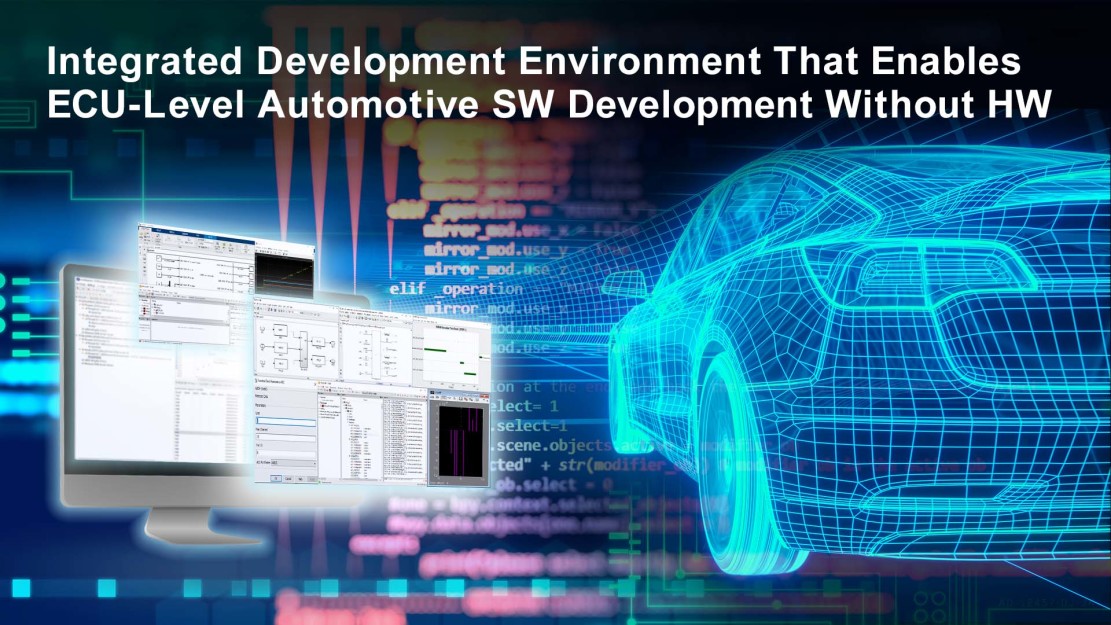New Integrated Software Development Environment Supports Multi-Chip ECUs, Reducing Development Time and Post-Design Modifications
Renesas Electronics Corporation (TSE: 6723), a premier supplier of advanced semiconductor solutions, today launched a new integrated development environment that allows engineers to rapidly create software for automotive ECUs (Electronic Control Units) containing multiple hardware devices. The fully integrated environment supports co-simulation, debug and trace, high-speed simulation and distributed processing software over multiple SoCs (System-on-Chips) and MCUs (Microcontrollers)—all without the need for actual hardware. This software development environment recognizes the automotive industry’s shift toward “Software First” product development, in which a vehicle’s value is increasingly defined by its software, as well as the “Shift Left” software design approach, which emphasizes software verification and validation earlier in the development cycle, before hardware is available. The first development environment tools are available now for the- R-Car S4 and RH850/U2A devices.
“Renesas is committed to providing a development environment that helps our automotive customers realize their vision for Software First, while continuing to support their evolution toward Shift Left software development,” said Hirofumi Kawaguchi, Vice President of Renesas’ Automotive Software Development Division. “We are confident that this development environment will help our customers transform their E/E architecture and facilitate the early development of ECUs and new products, and ultimately deliver more value.”
Integrated Development Environment for ECU Development with Multi-Device Configuration
Renesas’ integrated development environment with multi-device support enables software development at the ECU level, adding additional value in vehicles and contributing to the Software First approach. By providing a simulation environment from early stages of product development, the platform enables verification and application development before production of actual devices and ECUs, realizing the Shift Left concept.
The integrated environment offers the following development support:
1. Co-simulation environment for multi-devices facilitating optimal system design
By integrating and connecting simulators such as the R-Car Virtual Platform, which was previously provided for single-chip individual devices such as SoCs and microcontrollers, Renesas is delivering a new simulation environment for multi-device operation. Designs can now be optimized by balancing different application functions and incorporating software verification at the systems level. A development tool that automatically generates software code for devices and a simulation environment for verification from MATLAB® /Simulink® models will also be available. These tools will allow engineers to evaluate performance and start application development before hardware and ECUs are in production.
2. Debug and trace tool for multi-devices to visualize problems
To make it easy to visualize how software operates internally, Renesas is providing a debug and trace tool that allows simultaneous and synchronized execution, execution control by breakpoints and information tracing for ECUs containing multiple devices. With this tool, users can visualize processing flows, evaluate performance profiles, and anticipate problems that may arise from operating multiple devices which are intricately linked within the same ECU. Renesas plans to implement the same functionality mentioned above (1) in the multi-device co-simulation environment so that debugging and tracing can be performed on a computer without an ECU.
3. High-speed simulator for software development that achieves rapid and large-scale simulations
Typically, in ECU-level simulations, the target software tends to be large and the simulation execution takes a long time. This new high-speed simulator is based on QEMU, an open-source virtual environment that models SoCs and microcontrollers at a high level of abstraction, enabling faster ECU-level simulation of complex software.
4. Distributed Processing Software for multi-devices that enables design without considering hardware configuration
This software enables optimal distribution of application functions to CPUs and IPs inside different SoCs and microcontrollers in an ECU, maximizing hardware performance. With this software, engineers can develop applications rapidly, without being constrained by the ECU hardware configuration. For example, developers can add an AI accelerator to an existing ECU to boost system performance, without having to re-design the application to accommodate the new device.
The new development platform is designed to reduce the impact on the environment by providing a turn-key solution that accelerates time to market and saves energy.
Availability
- Co-simulation environment for multi-devices (Available today)
www.renesas.com/software-tool/co-simulation-environment-multi-devices - Debug and trace tools for multi-devices (Available today)
www.renesas.com/software-tool/debug-and-trace-tools-multi-devices - High-speed simulator for software development (Available in December 2022)
www.renesas.com/software-tool/high-speed-simulator-software-development - Distributed processing software for multi-devices (Available in December 2022)
www.renesas.com/software-tool/distributed-processing-software-multi-devices












